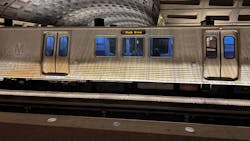WMATA final phase of 7000 fleet’s Return to Service Plan
The Washington Metropolitan Area Transit Authority (WMATA) may be nearing conclusion of what is now nearly a 17-month process to fix and restore its full fleet of 7000 series rail cars to service. With concurrence from the Washington Metrorail Safety Commission (WSMC) on its April 10 Return to Service Plan, WMATA is entering the final phase of the plan.
The final phase of the Return to Service Plan consists of two steps, with cars being measured at a 15-day interval for a minimum of 30 days before progressing to the second step, where the cars are measured at a 30-day interval. WMATA will collect wheel movement data and analysis, as well as monthly vehicle/track interaction data and analysis for a report to be submitted after the initial 30 days of the 15-day measurements before it advances to measurements at 30-day intervals. WMATA will continue collecting data and analysis.
In this final phase, there are no restrictions on the number of 7000 series cars WMATA can place into service, and the cars will be able to operate on all Metrorail lines. WMATA has been working to increase train service throughout its system as ridership continues to grow .
"This is good news for Metro customers. The WMSC’s concurrence on the 15-day plan means more 7000-series cars are available for more frequent and reliable service,” said WMATA Chief Safety and Readiness Officer Theresa M. Impastato. “This final phase of our Return to Service plan is built upon nearly a year of continuous refinement of our measurement process and makes more of our 7000 series fleet accessible to provide service throughout the region."
WMATA has also included an option for the second step of the plan that would involve its automated wayside inspection systems (AWIS) it installed in the spring of 2022. WMATA has not verified AWIS as an operational system safe for use, but once AWIS processes and procedures are developed and certified, WMATA would work under the oversight of WMSC on a new plan to incorporate its use to measure the rail cars at an interval based on the latest data analysis.
The 7000 series railcars will remain in Step 2 of this Final Return to Service plan until their wheelsets can be replaced. In early March, WMATA outlined what it estimated to be a three-year, $55 million proposal to repress all wheels on the 7000 series fleet. This plan remains in development and will require approval from the WMSC.
In a series of tweets detailing statements at its April 11 meeting, WMSC said it would continue to follow up on parallel work that was initiated to determine ways to address other likely contributing factors to wheel movement on Metrorail axles, including evaluating frogs in special trackwork and restraining rail specifications and installation.
While certain steps of the 7000 series fleet service restoration seemed to sow tension between WMATA and WMSC, both entities reiterated their commitment to collaboration and ongoing communication to ensure the railcars return to service in a safe manner.
About the Author

Mischa Wanek-Libman
Group Editorial Director
Mischa Wanek-Libman is director of communications with Transdev North America. She has more than 20 years of experience working in the transportation industry covering construction projects, engineering challenges, transit and rail operations and best practices.
Wanek-Libman has held top editorial positions at freight rail and public transportation business-to-business publications including as editor-in-chief and editorial director of Mass Transit from 2018-2024. She has been recognized for editorial excellence through her individual work, as well as for collaborative content.
She is an active member of the American Public Transportation Association's Marketing and Communications Committee and served 14 years as a Board Observer on the National Railroad Construction and Maintenance Association (NRC) Board of Directors.
She is a graduate of Drake University in Des Moines, Iowa, where she earned a Bachelor of Arts degree in Journalism and Mass Communication.
